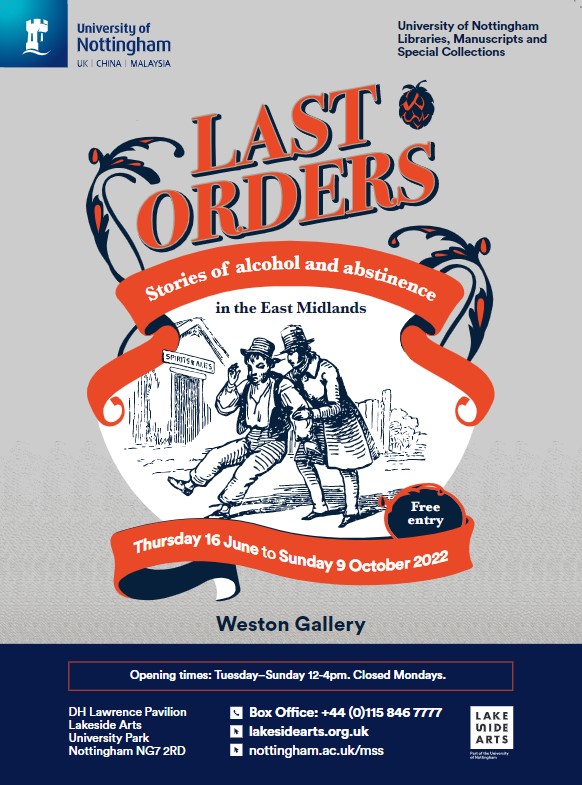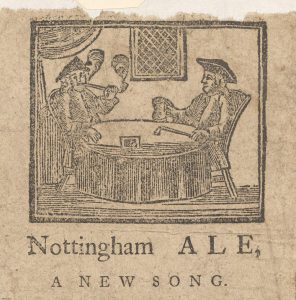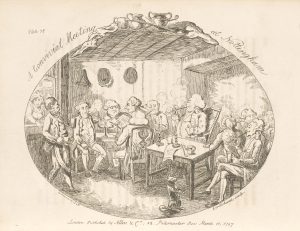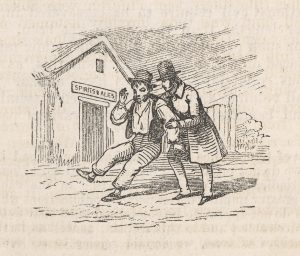
June 7, 2022, by Sarah Colborne
Last Orders at the Weston Gallery
This is a guest post by Dr David Beckingham, co-curator of the Last Orders exhibition, which opens at the Weston Gallery, Lakeside Arts in June.
Last Orders examines cultures of alcohol consumption and abstinence in the East Midlands, with a particular focus on the eighteenth and nineteenth centuries. Ubiquitous though pubs and drink may have been in everyday life, I had anticipated several challenges in my research for the exhibition.
The first challenge, which has likely faced other guest curators before me, involved finding enough visual materials in the collections held by Manuscripts and Special Collections. As well as being informative a good exhibition has to be visually appealing if it is to attract visitors! Reflecting one of the key strengths of the archive, estate records have proved a major source for the exhibition. These include legal documents such as leases, written with a kind of aloof authority that still seems to have the power to intimidate centuries later, and letters about the management of the estates. Pubs feature across these sources but, with some exceptions, seldom do they say much about the look of pubs or seem visually appealing enough to display.

‘Nottingham Ale’ from Ballads. Vol. 1, Nottingham region (c.1700-1844). Special Collection, os.Pamph PR1181.B2
I also imagined a second and related challenge – to catch echoes of the sound worlds of local drinking spaces and so better understand how people used them. Here, things were a little easier than I had expected. Estate correspondence does reveal insights into the management of pubs, and diaries in the collections – notably those of nineteenth-century councillor William Parsons – point to everyday experiences of drinking.
Pubs were the almost accidental arenas of social and commercial life. So much so, that published town histories often mention pubs and drinking. One such reference is to a drinking song called “Nottingham Ale”. Penned around 1750, “Nottingham Ale” is a paean to local liquor. Gunthorpe, the landlord of the Punch Bowl on Peck Lane, apparently sent his navy-officer brother a barrel of his quality ale. The song, which was printed in different forms, was his brother’s thank you. Nineteenth-century accounts often omitted a verse about making women drunk – and made a point of explaining the omission to their readers.

Peck Lane, Nottingham: a scene of “smoke and politics”. Engraving from GM Woodward, Eccentric Excursions (1817). Special Collection, Oversize PR109.W6
The Derbyshire caricaturist GM Woodward praised the quality of the ale in the pubs of Peck Lane in his book Eccentric Excursions. They were a world of ‘smoke and politics’, said Woodward. Pubs were not simply places where politics was talked about; they were arenas in which political life was shaped, political opinions forged, and elections contested. To some, this made them potentially dangerous spaces.
Different temperance groups tried to recast pubs as a kind of policy problem, firmly establishing drink as a political question in its own right. The exhibition examines local reactions to late nineteenth-century alcohol policy. However asking the state to do more was only part of the battle. Calling time on pubs in local communities meant replacing their enduringly social function. The collections of the Lawson and Wrench families, as well as those of local nonconformist churches, contain plenty of information about the personal and collective motivations for temperance. Just as pubs had their own distinctive material and musical cultures, so too did the temperance movement.
Last Orders: Stories of alcohol and abstinence in the East Midlands has been jointly curated by Dr David Beckingham of the School of Geography and Manuscripts and Special Collections. It runs from Thursday 16 June until Sunday 9 October 2022 at the Weston Gallery, Lakeside Arts.
Exhibition Events
Lunchtime Talks
1-2pm, £3 (free concessions)
A series of talks will be held in the Djanogly Theatre to accompany the exhibition. Talks are £3 (concessions free). All talks start at 1pm and last for approximately one hour. Advance booking is recommended.
Beer Flavour – A matter of taste?
Beer remains the UK’s favourite drink, although consumer tastes in beer styles have evolved throughout the history of industrial brewing. Professor David Cook of the University’s International Centre for Brewing Science will examine how beer stimulates our senses and evaluate historical and modern trends in consumer preference and expectations for our national drink.
Taking the pledge: The temperance movement in Britain
From its foundations in the 1830s, the temperance movement offered its members a vision of individual and collective improvement if they abstained from alcohol. In this talk Dr David Beckingham of the School of Geography will illustrate how temperance groups were organised and investigate how they impacted national debates about drink control for the rest of the 19th century.
Does the way we drink alcohol change with age?
How do people drink in different times of their life? Does pouring your own drink at home change how much you consume? Dr Katy Jones of the School of Medicine will explore current research on patterns of alcohol consumption and whether people drink differently in different life stages.

Engraving from W and R Chambers, ‘Chambers’s Miscellany of Useful and Entertaining Tracts’ (1845). Briggs Collection, LT210.A /C4
Weston Gallery Tours
Free, advanced booking required.
Join us for a guided walk through the exhibition and learn more about the items on display.
- Saturday 18 June, 11am-12noon
- Sunday 19 June, 11am-12noon
- Thursday 11 August, 11am-12noon
- Wednesday 28 September, 2-3pm
Book tickets through Lakeside Arts Box Office: +44 (0)115 846 7777
To see the original archives and rare books, please contact Manuscripts and Special Collections on mss.library@nottingham.ac.uk to make an appointment to visit the Reading Room.
No comments yet, fill out a comment to be the first

Leave a Reply